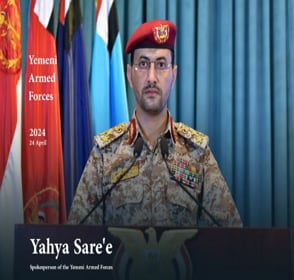The following report is now a complimentary offering from MEMRI's Jihad and Terrorism Threat Monitor (JTTM). For JTTM subscription information, click here.
On July 30, 2022, the Islamic State (ISIS) Somalia province released a 25-minute video in Amharic, subtitled into Arabic, titled "On the Path of the Conquerors," seeking to recruit Ethiopian Muslims to join ISIS in Somalia.[1]
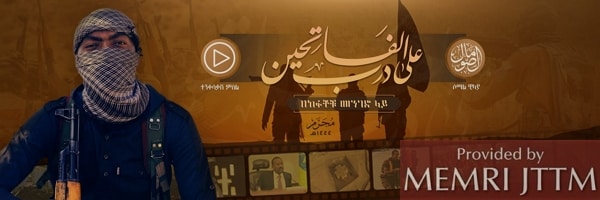
The three most recent videos released by ISIS have all been in non-Arabic languages – a June 14 video by the Islamic State West Africa Province (ISWAP) in Hausa,[2] a July 1 video from Iraq in Kurdish,[3] and the video from Somalia in Amharic – suggesting this is the beginning of a series seeking to recruit non-Arab populations in Muslim countries.
Conflict Between Islam And Christianity In The Horn Of Africa Dates Back To Dawn Of Islam
The video opens with a narration of the history of the conflict between Islam and Christianity in the Horn of Africa, noting that some of the Prophet Muhammad's Companions sought sanctuary with the Ethiopian king to escape persecution in Mecca. It sees their migration to the Horn of Africa as the emergence of Islam in the region and the start of the struggle between Muslims and "unbelieving Christians."
Following the narration, an ISIS fighter identified as Abu 'Isa Al-Ethiopi claims that the Ethiopian Christians hated Islam and tried to help the tribe of Quraysh return the Muslims to Mecca, adding: "This demonstrates the great harm and enmity which the Muslims met at the hands of the Ethiopian Christians." He further claims that as Islam spread through the Horn of Africa, over the following centuries about ten "Islamic emirates" were established which protected local Muslims from Christians in the Amhara and Tigray highlands, who "raided Muslim areas." The first such emirate was the Sultanate of Showa, established in the 9th century.

Praising the 15th-16th-century Adal Sultanate, ruled by Imam Ahmad Al-Ghazi, as the "launching point of jihad and raids against the Ethiopian crusaders," Abu 'Isa asserts that Al-Ghazi "paved his path with the skulls of the unbelievers" and captured important churches and Christian cities in the Ethiopian highlands from which "plots were devised against the Muslims." When "the crusaders' prestige was broken and they realized that their end at the Muslims' hands was only a matter of time," they sought the help of Europe's Christians, who sent an army commanded by the Portuguese Cristóvão da Gama, but he was defeated and killed by the Muslims. As a result of this victory, according to the ISIS fighter, the Muslims "ruled most of the Land of the Two Hijrahs [migrations, i.e. the Horn of Africa] by Islam and Allah guided many people to Islam at their hands."
Christianity Gained Ascendancy Over Islam In Ethiopia When Muslims Abandoned Jihad
Abu 'Isa ascribes the setbacks suffered by the Muslim emirates in subsequent generations to their abandonment of jihad, saying that after they "abandoned the road of the rightly-guided ones and the path of the conquerors," the Christians regained control over the Muslims, abrogated the rule of shari'a, and burned mosques. The ISIS fighter claims that 17th-century Ethiopian Emperor Yohannes forced many Muslims to abandon their religion and convert to Christianity, while 19th-century Emperor Menelik II converted many mosques in the Harar region into churches, fomenting "tribal, ethnic, and racial hatred" against Muslims. According to Abu Isa', following the establishment of the modern Ethiopian state and until today, the country's Muslims "have sunk under the dominion of the Christians," who have become more powerful than they were during their previous monarchies.
The Christians rule Ethiopia "in the name of the homeland and idolatrous nationalism," charges Abu 'Isa, and have "caused people to leave Allah's religion in droves." He lashes out at "clerics and preachers of misguidance" belonging to the Muslim Brotherhood and the Madkhali and Ahbash religious movements, who issue fatwas calling for Ethiopian Muslims to "enter the unbelief-based religion of democracy" and participate in their "parliament of polytheism." Alluding to episodes of anti-Muslim violence that have broken out in Ethiopia in recent years, Abu 'Isa asserts that those Muslims who have "chosen unbelief over belief" have found only "humiliation and submission," such as the destruction and defiling of their mosques. He further accuses "apostate clerics" of aiding the Ethiopian government to prevent Muslims from practicing their faith, claiming that for decades, "Muslim children are being educated with misguided curricula and ideas in government schools," while anyone who shows any "Islamic inclinations" disappears in prison, or is even tortured and killed.

Call On Ethiopian Muslims To Travel To Join ISIS
Issuing a call to Ethiopian Muslims in the video, Abu 'Isa states that since the Muslims have followed the "path of the conquerors" and established an Islamic State, it has become obligatory for all members of the religion to relocate to ISIS territory to "increase the numbers of the Muslims and establish religious matters." Declaring that in these areas the current conflict is between the forces of belief and those of unbelief, he urges Muslims to leave behind "the life of humiliation and abasement" in Ethiopia and "approach your glory and honor." He adds: "Fight for your religion just like those Christians fight for their religion. Allah has promised you victory as long as you cling to your religion." As for the "sincere scholars," Abu 'Isa calls on them to fulfill their duty of "inciting jihad," saying: "[Religious] knowledge needs action and preaching needs jihad."
An excerpt of a message by slain ISIS leader Abu Bakr Al-Baghdadi calling Muslims to jihad then plays, with Amharic subtitles.
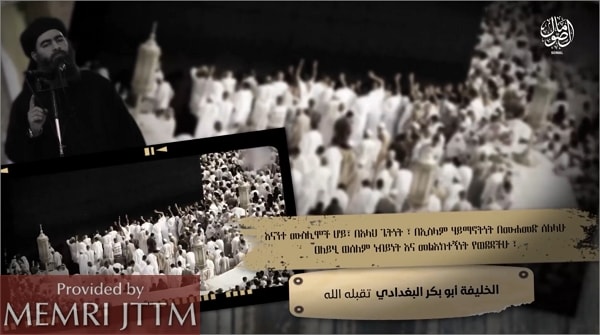
Illustration Of Travel From Ethiopia To Join ISIS In Somalia Following Online Coordination
The next part of the video presents an imaginary online chat in Amharic between the representative of a group of Ethiopian Muslims and an ISIS recruiter. The recruiter types:
-
"Dear brother, tomorrow you will travel, Allah willing. Inform your group."
-
"We are ready."
-
"We have arranged the way for you. Tomorrow you will leave your place, then you will arrive in [redacted] and the rest [of the trip] will be easier, Allah willing."
-
"Okay. Brother, do not forget us in your sincere prayers."
-
"Allah willing, you will arrive safely. Invoke Allah often and do not forget the instructions. Follow them as they are."

A group wearing backpacks is then shown walking along a deserted road, meeting and embracing ISIS operatives, prostrating themselves in thanks, and entering an ISIS vehicle, to arrive at an ISIS "guesthouse" in Somalia. A recruit whose face has been digitally blurred speaks from the guesthouse: "Praise to Allah, we have arrived safely. Now we will stay at the guesthouse. Our ansar and muhajireen[4] brothers have welcomed us. We ask Allah to grant us steadfastness. We will stay here until the [training] camp begins. We ask [Allah] to receive us [as martyrs] while we are on this path [of jihad] and this blessing which Allah bestows upon those of His servants whom he wishes. Praise to Allah who has chosen us and helped us successfully join this group. We will be here with our brothers, Allah willing."

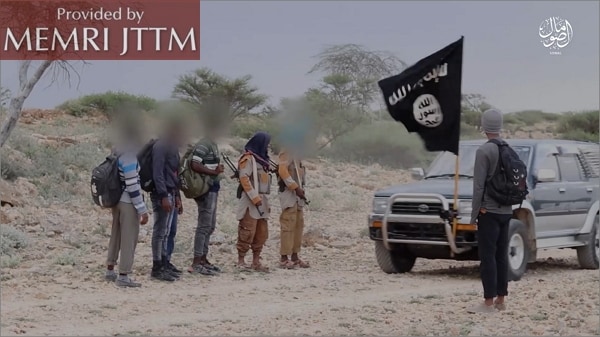

Scenes From A Training Camp In Somalia, Threats To "Unbelievers And Apostates," Call For East African Muslims To Migrate to ISIS Territory Or Carry Out Attacks In Their Countries
An ISIS cleric identified as Abu Hafsah Al-Ethiopi is shown with his face digitally blurred, quoting hadiths such as: "A strong believer is better and more beloved than a weak believer." The cleric declares that based on these hadiths, "we have established – with Allah's grace – a training camp for the muhajireen and ansar brothers who have left the lands of unbelief and migrated to the land of Islam to elevate Allah's word, with the goal of preparing them religiously and militarily." The training camp was named after Hafiz Saeed Khan, a slain leader of the Islamic State Khorasan Province (ISKP). The cleric explains that recruits first attend "intensive shari'a courses" before proceeding to "military and physical studies," which include physical fitness exercises; training in the use of various weapons, explosives, and communications equipment; and military tactics such as guerilla and urban warfare.

With training scenes in the background, the video shows an unidentified trainee at the camp wearing a head-mounted camera, who says in Amharic: "In compliance with Allah's command, we are today making preparations. We ask Allah to keep us steadfast on this path until He grants us martyrdom." He then issues a threat to the organization's enemies: "O unbelievers and apostates, we will come to you in your lands with weapons and knives, with conviction and trust in Allah." Addressing Muslims who remain in Ethiopia, he tells them: "Do not choose to live in humiliation out of fear of death. If the path of hijrah is not available to you, wage war on the unbelievers wherever you are."

Another trainee is shown issuing a call for hijrah, also in Amharic: "Finally, to the Muslims in East Africa and all places, particularly the people of Ethiopia, obey Allah by making hijrah and waging jihad, which Allah has enjoined upon us. The provinces of the Islamic State have their doors wide open to you and its [training] camps have been prepared to receive you. All that you have to do is to be sincere, have the correct intentions, and make hijrah."
After undergoing training, including jumping through rings of fire and target practice, with pictures of Ethiopian Prime Minister Abiy Ahmed and U.S. president Joe Biden as the targets, the recruits swear allegiance to the ISIS leader. The video shows only the last part of the bay'ah (oath of allegiance), so it cannot be determined if the recruits are swearing loyalty to the current ISIS caliph, Abu Al-Hasan Al-Hashemi Al-Qurashi, who was appointed in February or March 2022, or to one of his predecessors.

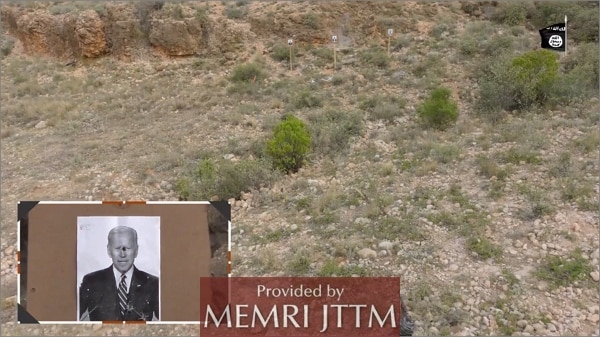
Trainee From Arabian Peninsula Castigates Muslims Who Refrain From Jihad, Commends ISIS Fighters In Syria And Iraq
Another trainee, Abu 'Abdallah Al-Jazrawi, who is apparently from the Arabian Peninsula, is shown speaking in Arabic, and his message subtitled into Amharic: "Today we see the bliss and happiness we are in. We have left our homes and families behind us and our possessions and many things, only to defend Allah's religion. […] By Allah, if we would have millions [of dollars], we would not have such happiness. We find it today in a loaf of bread, we sleep on the ground with the sky as our blanket. This is happiness beyond compare."

Addressing Muslims who refrain from jihad, Al-Jazrawi asserts that Muslims today can be divided into a camp of faith and another of hypocrisy, and asks which one they would like to belong to. He urges them to wage jihad to avenge Muslims who are being imprisoned and killed: "To whom do you leave your imprisoned sisters? To whom do you leave your brothers? They are killed and displaced for elevating Allah's word." Stating that the "nations of unbelief have ganged up against us on all sides," Al-Jazrawi insists that the various enemies of Islam, some of whom "falsely claim to be Muslim, some claim to be mujahideen, some of them are crusaders who have raised the banner of the Cross plainly and openly" have been emboldened by the "submission" of most Muslims. He challenges them: Prepare a response for your Lord when you will meet him [and are asked]: 'What have you offered Islam? What have you done for your brothers?' Your Prophet is publicly insulted today in the Western countries before your eyes. What is your response? What do you do?"
Addressing ISIS mujahideen worldwide and praising their jihad, Al-Jazrawi says: "By Allah, our enemies today have begun to barricade themselves before they go to sleep in their homes, fearing that one of the caliphate lions will pounce on them wherever they are." He singles out the organization's fighters in its original countries of operation, Syria and Iraq, for praise, commending the "brothers in Syria, who remain steadfast to tests and trials." He also asks Allah to "ordain victory and success" for the "brothers in Iraq," urging them to continue their attacks against the "Rafidites [a pejorative term for Shi'ites]."
[1] Telegram, July 30, 2022.
[2] See MEMRI JTTM Report: ISIS Video Documents Attacks On Nigerian Army, Highlights ISIS Preachers' Outreach Efforts Among Locals, Including Children; Hisbah Police; Zakat Distribution, June 14, 2022.
[3] See MEMRI JTTM Report: In Kurdish-Language Video, ISIS-Iraq Calls On Kurds To Join Its Ranks, July 4, 2022.
[4] In Islamic history, the term muhajireen (literally "immigrants") refers to the Prophet Muhammad's followers who fled with him from Mecca to Medina, in contrast to the ansar (literally "supporters"), the local population of Medina, who welcomed Muhammad and his followers. Modern jihadi groups often use the term muhajireen to refer to foreign fighters and ansar to local mujahideen.
The full text of this post is available to subscribers.
Please login or register to request subscription information from MEMRI




